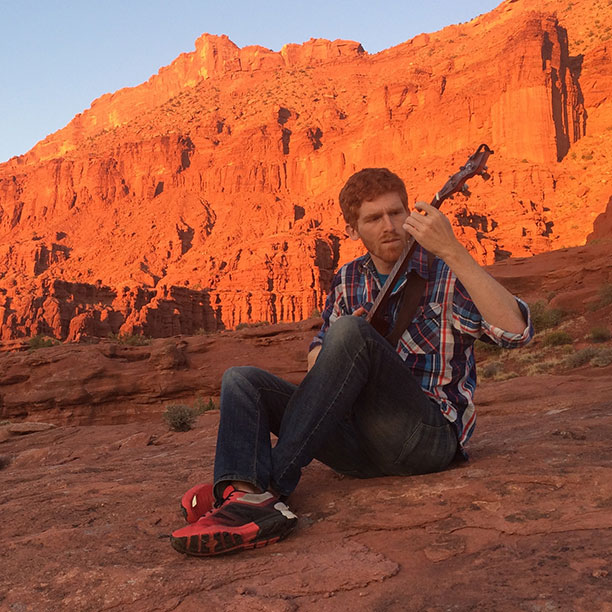Ben Barron ’13 Pairs Environmental Storytelling With Music and Film
Barron, who plays banjo and guitar, met three fellow student musicians — cellist James Mitchell, fiddler Sarah Noyce, and guitar and mandolin player David Carel. “We decided to play a bit one evening, and immediately clicked,” Barron said. They formed an indie folk band called The Infamous Flapjack Affair, and went from jam sessions to gigs, eventually recording an eponymous EP and headlining local festivals.
“At the end of our two years in Oxford, we were on the hunt for ways to keep the band active — and for opportunities to imbue our music with purpose,” Barron said. They realized that the 100th anniversary of the U.S. National Park Service was coming up in September 2016. Inspired by Mitchell’s long-term hope to use music to call attention to worsening water scarcity around the Colorado River Basin, they hatched a plan to travel from the Grand Canyon to the river’s headwaters in Rocky Mountain National Park, write music about it, and create a film about their experiences.
“Our goal was to meet people who had crafted their lives in the River Basin, to hear their stories about the places that had shaped them and the challenges facing those places, and to write music inspired by those encounters,” Barron said.
The band spent a year researching and fundraising, and hired the documentary film production company National Park Experience to work with them. Barron describes the three-week documentary shoot in September 2016 as an “absolute whirlwind,” with frequent 4:30 a.m. starts, long drives between locations, and late nights composing music.
Confluence is coming to Princeton. The film will be screened April 22 at 4:30 p.m. in East Pyne Hall.
“Much of the storytelling process came after the shoot, reviewing what we had captured and doing our best to align the story we wanted to tell with the story we were able to tell with the footage we had,” Barron said. “This process was as grueling as it was gratifying.”
After two years, the film was complete. Confluence premiered at the Boulder Adventure Film Festival in October 2018, taking home the festival’s “Make Your Own Legends” award (which honors a film that “exceeded traditional paradigms to achieve positive change in this world through the power of storytelling”). The documentary has since received awards of excellence from The IndieFEST Awards and the Impact Docs Awards, and has been screened in more than a half-dozen cities. “Our main goal is to inspire thoughtful conversation around the human relationship with land, and to help people reconsider their own relationship with the places that shaped them,” Barron said.
Eventually, the film will live online and the band will seek out its next project. Barron will begin working toward a Ph.D. in geography at the University of Colorado in August. “I look forward to diving ever deeper into the intersection between people and place,” he said.












No responses yet